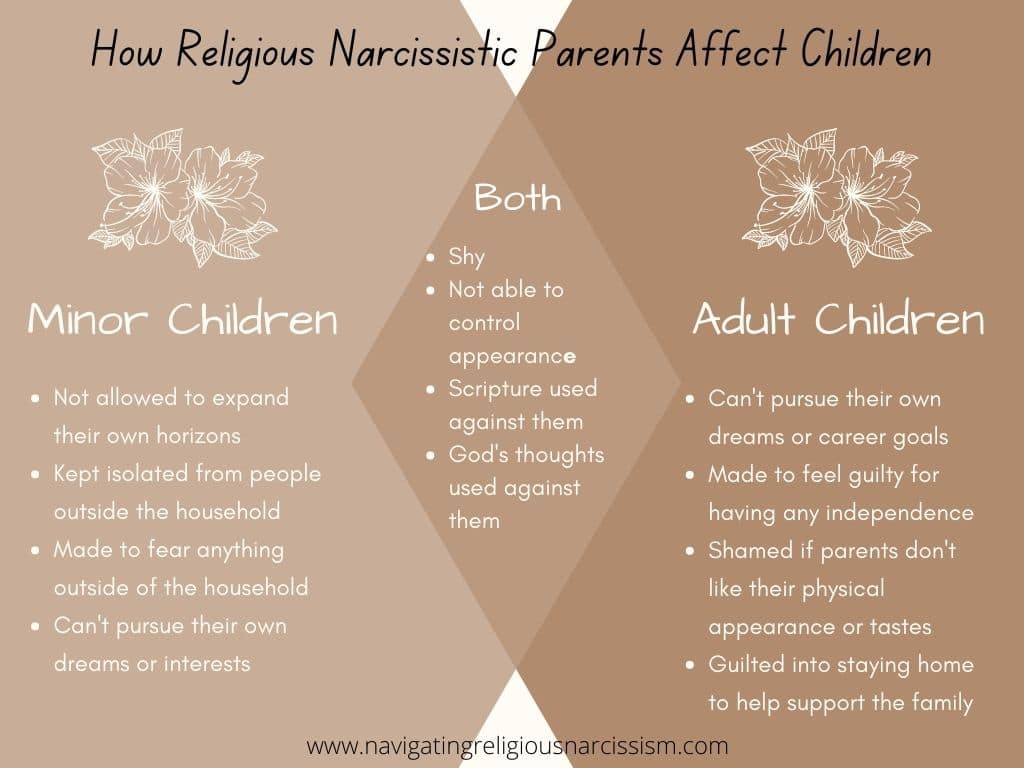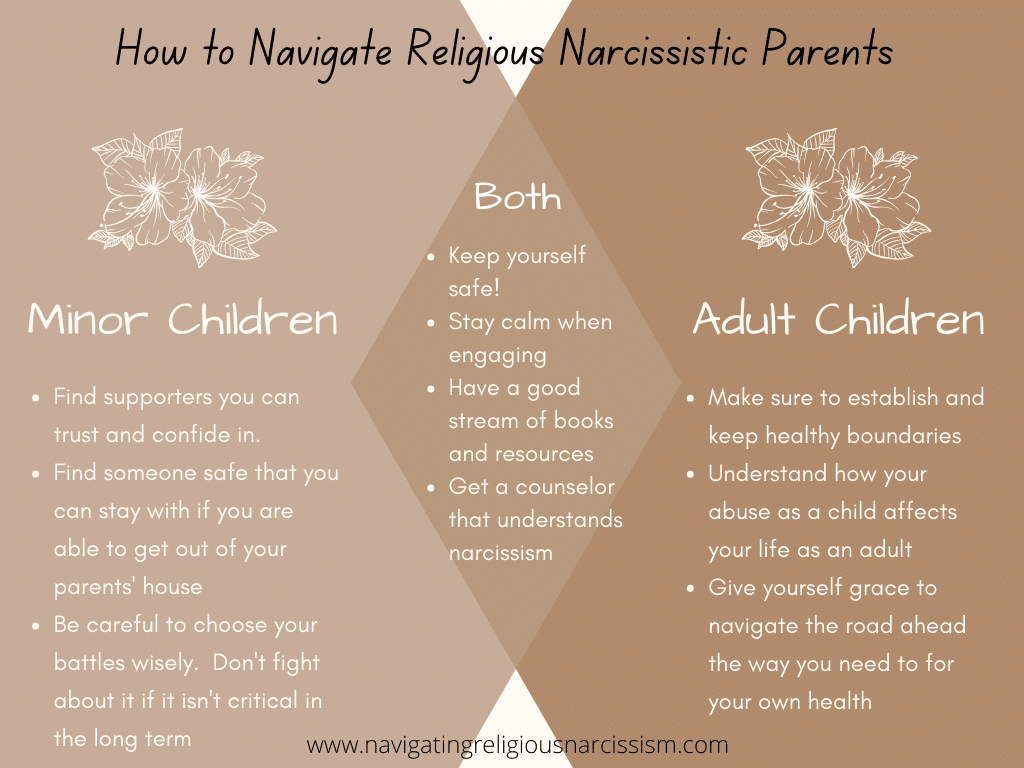Reviewed by Karis A. Williams, MSMHC, LPC, December 18 , 2023
Growing up is tough. Every child has difficulties in relating to parents in many of the stages of growth, from preschool to elementary to junior high, and especially in high school. Even more common are adult children who still have difficulties relating to their parents. And honestly, parents can have just as much difficulty relating to kids. But what about when one or both of your parents are spiritual narcissists?
The older you get, the more you will be able to identify and figure out how to navigate religious narcissistic parents. Because it is your parents, it can be harder to work through. Especially if you are young, you cannot just leave. You must be able to recognize the hallmarks of narcissistic parents. You will need a counselor experienced in narcissism who can help you recognize the issues and work through them. Next, have a few safe friends you can confide in, learn how to handle gaslighting, and disengage when boundaries are crossed. And finally, you must understand that your relationship with them will never have elements that “normal” relationships do.
Let’s take a closer look at the damage done by narcissistic parents and how to navigate your way through.
Table of Contents
How Does a Religious Narcissistic Parent Affect a Child?
I always wondered what aspects of myself were based on who I am and what aspects were based on how I was raised. Unfortunately, I was raised under a narcissistic mother, and then went straight from that home into a home with my narcissistic husband, where I stayed for 31 years before all was said and done. I am in my 50’s now, and for the first time I am living life out from under the thumb of a narcissist. And I am realizing that much of my behavior has been based on being under the authority of a narcissist. Let’s look at some of those behaviors in my growing up years.
The Child of a Narcissist is Shy
I was painfully shy. But I also felt invisible for the most part. It was very hurtful that I was often not heard when I talked. So I stopped talking. To the point that when I did talk my voice would frequently crack and never quite worked right because of lack of use.
I became very comfortable hiding from people. There were times I actually felt sick if people gave me too much attention that I didn’t want to receive. I thought it was healthy to be alone in my room or in the corner of the party, where isolation became my friend. I had no idea what those childhood feelings of insecurity would cause difficulties well into my adult years.
The Child of a Narcissist Cannot Have Their Own Thoughts
As a child of a narcissistic mother, I wasn’t allowed to have my own opinion. I had to agree with everything she said or believed. If I veered from that, not only was I wrong in her eyes, I was also stupid.
Because a child can’t have their own thoughts, they feel used and manipulated by their parents. Their value is solely based on mirroring the parent, not formulating their own ideas. And because of this, children of religious narcissistic parents don’t develop a sense of decision-making or autonomy. They are too busy living up to the image ideals of the parent. There is no true authenticity.
Speaking of image, my mother expected only the best out of me, not because she wanted the best for me, but because she needed everyone to see what a great job she was doing as a mother. It was all about how others perceived us. If I had the highest grades and the best behavior, then she was a success as a mom. If I veered from that, there was hell to pay. This goes right along with not being able to have my own thoughts. I also couldn’t behave or experience the things I wanted to. I had to live out the life that she wanted me to live.

The Child of a Narcissist Cannot Look the Way They Want
Interestingly enough, I wasn’t allowed to look the way I wanted to. I always wanted long hair. But after first grade, it was cut incredibly short and kept that way until I was 18 and said no more. This one is odd to me because since she wanted my behavior to be so impeccable, you would think she would want my appearance to be its best too. But that was not the case. It was more about control than about looking my best. I was embarrassed by my appearance until the day I left my childhood home.
“No Makeup Allowed”
Another issue regarding my appearance was wearing makeup. It was taboo. When I got back from college at the age of 20, I was wearing makeup. My mother said I could not wear it as long as I was living in her house. But my father said it looked nice. My mother responded that if I continued to wear it I would have to leave the home. I told her I was 20 years old and would be wearing it because it was not wrong and it was a social norm at the time in the department store I worked in.
“You Can’t Wear That Dress!”
Soon after the makeup incident, I wore a dress to my soon-to-be in-law’s 30th wedding anniversary party. My mother didn’t like the dress. But my father said it looked nice. (Are you seeing a pattern here?) I said I was going to wear it. She said if I left the house with it on my bags would be packed and on the porch when I got home. I didn’t respond. And I didn’t change.
When my fiancé’s mom came to pick me up for the party, we were in the kitchen getting ready to leave. My mother announced in front of my mother-in-law that if I wore that dress out of the house, my bags would be packed and on the doorstep when I returned. My fiancé’s mother looked at me, then said, “That is a lovely dress. If your bags are on the porch when you get back, you can come home with me.
That is exactly what happened. And I stayed there for the next 4 months.
Those were some of the tactics of control in the house I grew up in. The rules change depending on whatever the narcissistic parent wants to control. In someone else’s house, the rule may be that you need to wear makeup when you don’t want to. The rules are not based on the circumstances, but on the level of control that can be exercised against you.
The rules can change even with that one parent. If they can keep you guessing, you can’t keep any type of equilibrium. And it depends on how well you accept the change. If I hadn’t balked at my mother’s no-makeup rule, she would have probably insisted a couple of weeks later that I DO wear makeup.

How Does a Religious Narcissistic Parent Affect an Adult Child?
Many of the issues with the children of religious narcissistic parents are based on the authority of the parent. So, how do things change when the child is an adult and no longer under the authority of the parent?
Unfortunately, it doesn’t seem to change very much. There is still very little support, especially in life choices. Many times, the narcissistic parent still believes s/he has the same level of authority as when the child was young and in the home.
Scriptures are Used to Defend the Religious Narcissist’s Views
Most of the other tactics of the religious narcissistic parent are the same as your garden variety narcissistic parent. But this one is different. And it actually can make the power of the parent over the child much stronger.
Using Scripture, sometimes even in semi-right context, makes it impossible for the adult child to respond properly. Anything they say in response will be sent into a word salad of Scripture. The child will be left reeling. And the narcissistic parent will walk away, puffed up with the pride that they just beat down their child with the very wisdom of God and WON.
Except they didn’t win. They just frustrated everyone but themselves. And they grieved the heart of God.
Even if you came back with the perfect Scripture in response, it wouldn’t be good enough. They will have twisted all of the verses they use in order to make it impossible for you to reason with them.
The Religious Narcissistic Parent Will Claim to Know What God Wants Better Than You
Sometimes the religious narcissistic parent cannot come up with the perfect Bible verse to convince you they are right and you are wrong. They will simply claim that they know what God wants for you because they are so close to God. They behave as though they have an inside line to God that nobody else has. And do you want to know what is even more maddening?! Many people will believe that they know what God wants more than them because they see the religious narcissist as more spiritual than them.
Religious narcissists tend to know the Bible really well. And many Christians simply don’t. The truth is that narcissists of all varieties are generally pretty smart people. They are good at keeping details of the things you have done “against them” completely straight, down to the smallest detail. But when it comes to them and what they have done to wrong you, all of a sudden they can’t remember anything.
And of course, the more accolades the religious narcissistic parent receives from others that they have fooled, the more they come down on the children. Over time, they know what makes people respond in positive ways and capitalize on mastering those things. It doesn’t take long before they elevate themselves to a position that is actually higher than God. But they are still using the name of God to thwart any question of their own authority.
Adult Children of Religious Narcissistic Parents Can’t Pursue Their Own Career Dreams
Adult children of religious narcissistic parents often find themselves trapped in the home instead of going off to college or other career paths. Their parents insist that they are needed in the home. They need to contribute to the life of the family, and going to college will mean they are doing harm to the family. It is the worst kind of manipulation.
Some religious narcissistic parents will go as far as to say that women do not belong in college or out in the workplace. They need to wait until they can be married and move into the home and family life of the man they marry. It is hard to believe this mentality is still alive today.
Religious narcissistic parents can also prevent their adult children from pursuing their career just by refusing to support their dreams. They may refuse to pay for a certain college degree because they don’t like it. Or they can say they will only pay for school if it is something they want their adult children to do.
While this point certainly makes life more difficult, it is something the adult child can work through. Finding other ways to get through school can be very difficult. But showing your parents that you can do it in spite of their refusal to help can give you the best sense of freedom and accomplishment. This is true both for your own sense of accomplishment as well as your sense of getting out from under narcissistic abuse. With that double reward, you should be feeling awfully good about yourself and your emotional growth!
How to Recognize Religious Parental Narcissistic Abuse
There are red flags that will help you recognize religious parental narcissistic abuse. But please realize no parent is perfect. Parents may do some of these things just because they mistakenly think they are the right things to do. My point is that being an imperfect parent doesn’t automatically make you a narcissistic parent. The type of narcissism I am talking about here is not narcissistic tendencies, but full blown Narcissistic Personality Disorder.
Here is a list of the most prominent ones:
- You feel like every idea or dream you have is shot down in favor of what they want.
- They use Scripture to convince you that you are wrong about something that isn’t necessarily right or wrong.
- The narcissist will tell you God told them what they are telling you. They will use God against you as their authority. They actually elevate themselves above God.
- You feel like they are not listening to what you are trying to communicate.
- They make overbearing rules for the sake of making rules.
- Children of any age will never feel like they measure up.
- The child will become a people-pleaser to prevent rocking the boat.
- Children will not set or keep healthy boundaries.
- Children will have a hard time making solid decisions due to cloudy thinking.
- The child will be expected to perform well to make the family look good, but can’t “look better than the parent.”
- Parents will control everything about the child’s life–even as they move into adulthood.
- Children will withdraw to stay under the radar.
- Children will have problems with trusting other people.
This list is just a start. I would love to hear some of what your experiences looked like in this realm. Feel free to share in the comments below!
How to Navigate Religious Narcissistic Parents
With all of the difficult hallmarks listed above, you can learn techniques to help you navigate religious narcissistic parents, whether you are a minor child or an adult child of a religious narcissistic parent.
Regardless of whether you are a child or adult, the first priority is to keep yourself safe! Confronting a full-blown narcissist on your own is rarely a wise thing to do. If you feel like you are physically in danger, then get out now. If there has already been any physical or illegal abuse, then contact the police or the National Domestic Violence Hotline at Hotline.org or 800.799.SAFE (800.799.7233)
Even if you feel like you are physically safe, it is still not wise to confront a narcissist alone. You will always need someone there to support you. Let’s take a look at some of the best ways to navigate religious narcissistic parents.
How to Navigate Religious Narcissistic Parents as a Minor Child
As a narcissist’s child, navigating yourself to a healthy place is going to be more difficult than if you are an adult. You don’t have full autonomy to make your own decisions. But there are things you can do to make life better.
First, find someone you can trust in confidence. That may be a teacher, pastor, counselor, neighbor, friend’s parent, youth leader, scout leader, or any adult you feel safe around. Having two confidants is even better. You can balance truth between them. BUT…make sure you can trust them! Not every leader will be someone you can trust. Unfortunately, many people will think they understand your situation but inadvertently give you destructive advice. This can do more harm than if you had never talked to them.
Second, find good books/resources to guide you! Check my list of materials here. You will find book recommendations as well as free printables. Most focus on learning to identify behaviors that put you in an unhealthy place and help you to learn healthy ways to deal with narcissistic issues.
Third, if you can get to a counselor that has experience in narcissism, you will be golden! They can help you form a support network that will literally turn your life around.
And fourth, if you can stay with someone else when things get too difficult, do it! It could be a friend, neighbor, adult sibling (make sure they are not doing the bidding of your narcissistic parent before considering them safe to stay with!), or anyone you know you can trust. It may be difficult, especially when the narcissistic parent does not want to give up control. By the time you get to this point, you will need to have support in place so you are not going down this road alone.
Keep Your Cool When Dealing With a Religious Narcissistic Parent
Maybe one of the most important things you can do when navigating a religious narcissistic parent is to keep your cool when you find yourself in a confrontation. Know that you could have the perfect argument, explanation, or proof, but it won’t matter. They won’t hear it. They won’t apply it. And they won’t accept it. They will only hold on to whatever they want to believe. And they will continue to beat you over the head with it as long as you are responding to them.
The best thing you can do is understand that the only engagement you will ever get is word salad and circular reasoning. You will never be able to come to an agreement, unless you are fully agreeing with everything they say. Don’t do that just to smooth things over! But also don’t let yourself get dragged in. Learn ways to engage and disengage that will not provoke them to escalate things. This is a very difficult lesson to learn, but one of the most valuable for the sake of doing more than surviving in your home.
How to Navigate Religious Narcissistic Parents as an Adult Child
While this road is certainly difficult, it is easier than trying to work through it as a minor. You will have more options in your own decision-making. You will have more opportunities to stand up for yourself. For starters, you can do all of the things mentioned above that apply to minor children.
Also, understand that even though you realize the damage that has been done and have gotten help, you still need to understand how narcissistic abuse has affected you as an adult. I was amazed to learn how much my childhood trauma had affected the way I did things as an adult. I cannot tell you how freeing it was to finally be able to think about things in a totally new way. Many people I have known for my whole life have told me I am a new person.
As a child, you may not have been able to obtain access to a counselor experienced in narcissism. As an adult, you absolutely can! And you NEED TO! Someone who is experienced in childhood narcissistic trauma is absolutely necessary. They will have the experience to see some of the deep damage that was done. And they will know how to get you through it!
Next, give yourself some grace! I think my counselor talked about this every week for over a year. It was so hard for me to feel like I could be less than perfect, or that I could be the person that I wanted to be. It takes a bit to get out from under that thumb of the narcissist. But you can do it! Start intentionally thinking about (or, better yet, writing down) things that you want to be and do! And then make those things happen! Healing is already beginning!
If you liked this article, I think you will also love the following articles:
What Happens to the Soul of a Narcissist?
How to Heal From a Spiritual Narcissist
Can You Maintain a Relationship With a Spiritual Narcissist?
Can Narcissists Have a Spiritual Awakening?
How Will God Judge a Narcissist?
When the Church Says to Move Back in With Your Narcissist
What Can We Say to a Friend Who’s Divorcing
23 Reasons Why Narcissists are Drawn to the Church
When the Church Doesn’t Recognize Narcissistic Abuse
Will the Church Support Divorcing a Narcissist?
What Does the Bible Say About Narcissism?
Can a Spiritual Narcissist Heal?
Can a Narcissist Be a Christian?
What Does the Spiritual Narcissist Do When You Try to Leave?
- How to Choose the Best Attorney When Divorcing a Narcissist - March 23, 2024
- Why Won’t God Heal my Narcissist? - February 28, 2024
- How Narcissists Use Religion to Control and Manipulate You - December 26, 2023







I’m reading on this subject because I ran for my life from a narcissistic church led by a malignant narcissist. I rejected the Pastor who was married and I am also married and he launched a campaign of stalking and harassment against me. He used other church members to stalk me and ultimately slander me to the entire community. I was knowledgeable on narcissism which made me immune to his love bombing. While I was attending I caught on that his wife is an inverted narcissist and one of kids is a narc, while the other is a scapegoat. It really hurt my heart for this scapegoat child. I feel called to pray for him. 😢
I am so sorry for the pain that was caused by someone who should have been caring for your family and spiritually protecting you. I also can’t imagine how alone that one child feels with nobody to lean on in their family. I hope they find support in teachers and other people who may be perceptive enough to know this child needs a lot of support and love. I am praying along with you. And I pray for you, that you find or have found a good, healthy supportive church that serves you well and that you can serve well. Thank you for sharing!